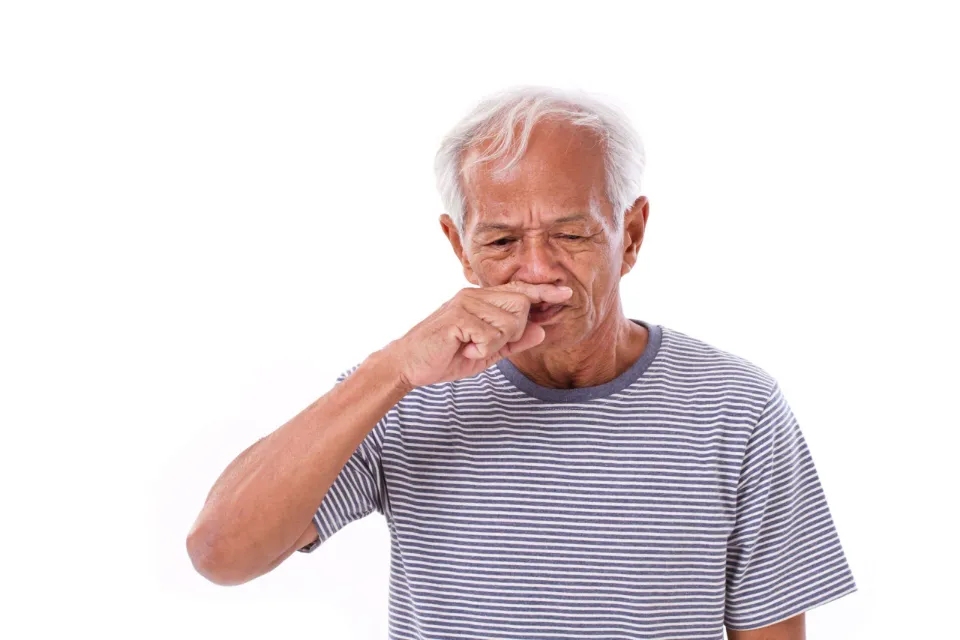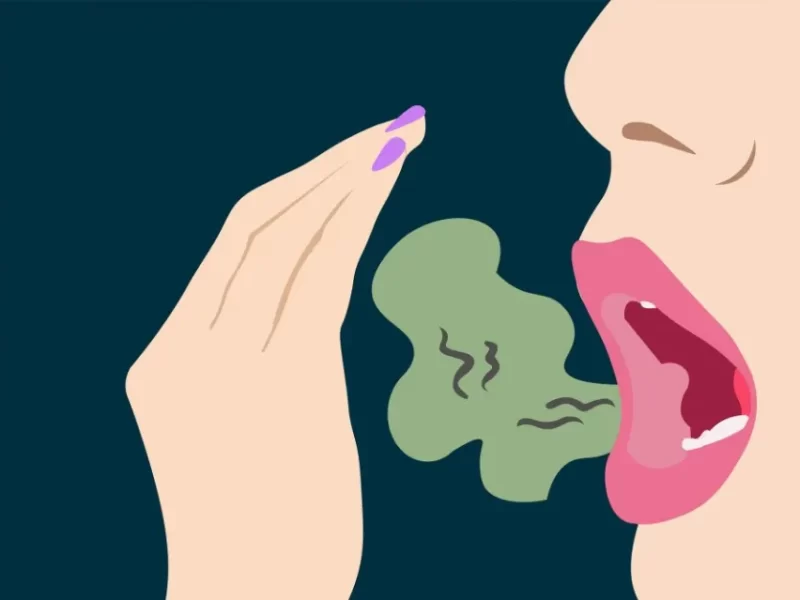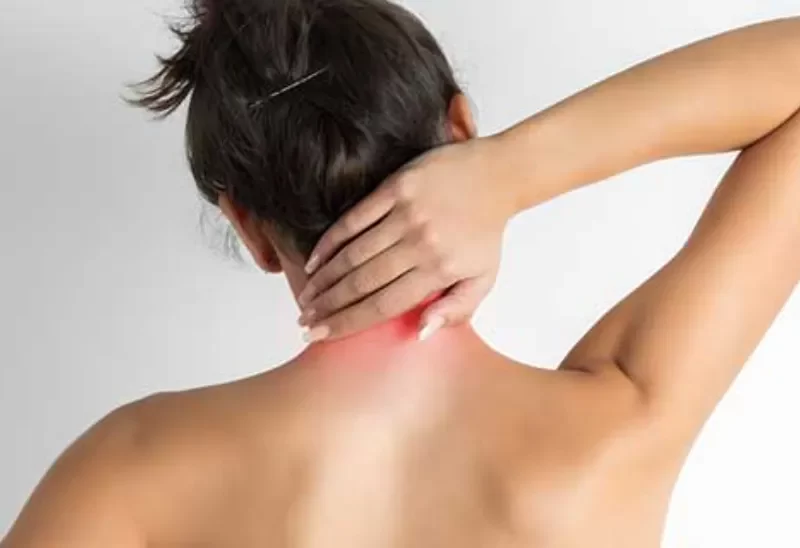Rhinitis is an inflammation of the nasal cavity’s lining or mucous membranes. Because it is not life-threatening, geriatric rhinitis, or rhinitis in senior patients, is a common but frequently disregarded condition.
Geriatric rhinitis patients may experience nasal blockage or congestion, runny nose or post-nasal drip, itchy nose, sneezing, and/or nasal dryness or crusting. Allergic, non-allergic, and atrophic rhinitis are the three main types.
Continue reading to learn more about the different types and symptoms of geriatric rhinitis. causes, and treatment options.
Know information about a chronic runny nose: Chronic Runny Nose: Causes & Preventions – Elder VIP
Types of Rhinitis in the Elderly
Allergic Rhinitis
As people get older, allergic rhinitis is less common. At 10 to 15 years old, the incidence peaks at 37 per 1000, while the incidence for those over 65 is less than 3 per 1000. Age-related changes in atopic individuals’ serum IgE levels are accompanied by a tendency for RAST and immediate-type skin test reactions to certain antigens and histamine to diminish. Despite being less frequent in the elderly, allergic rhinitis should still be taken into account.
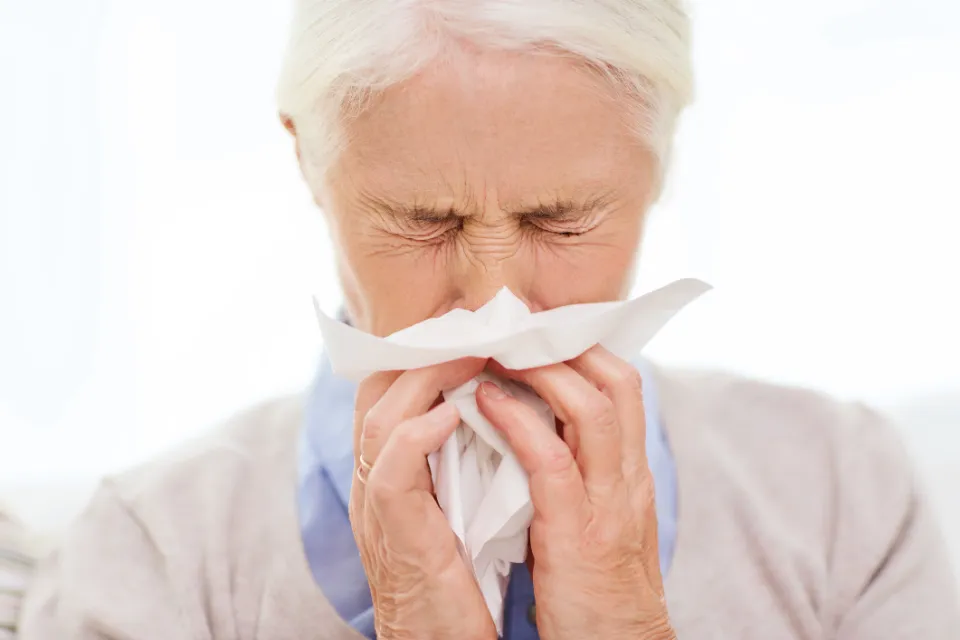
Non-allergic (idiopathic, Vasomotor)
Idiopathic rhinitis is the term for nasal mucous membrane inflammation that is unrelated to an allergy, an infection, structural lesions, or a systemic illness. The term vasomotor rhinitis is frequently used, which implies that the cause in known; this is not the case, however, and therefore the preferred designation is idiopathic rhinitis.
Drug-induced Rhinitis
Rhinitis is a side effect of more than 400 brand-name medications. It is well known that topical decongestants that inhibit α-adrenergic receptors on nasal vasculature can lead to rebound vasodilation with excessive use. Due to the nasal mucosa’s preexisting thinning and dryness, older patients are particularly at risk.
Gustatory Rhinitis
The symptoms of this condition include frequent rhinorrhea, especially after eating highly seasoned foods. A trigger could also be cold air. The rhinorrhea associated with gustatory rhinitis may be lessened by anticholinergic medications. Ipratropium bromide is now offered as a nasal spray with a 0.03% concentration, which has no systemic absorption and is both efficient and secure.
Atrophic Rhinitis
The elderly are frequently affected by this condition, which is causeless. Resorption of the underlying bone results in atrophy and crusting of the nasal mucous membrane. The crusting might produce ozena, an unpleasant odor. Primary atrophic rhinitis may be caused on rare occasions by organisms such as Klebsiella ozaenae. A bilateral intranasal sphenoethmoidectomy, which was once used to treat chronic rhinosinusitis, or a turbinectomy performed for nasal congestion can both cause secondary atrophic rhinitis.
What Causes Geriatric Rhinitis?
An allergic reaction to one or more allergens is what causes allergic rhinitis. Patients over the age of 60 who exhibit symptoms like persistent sneezing, watery eyes, nasal obstruction with a clear, watery runny nose, and soft, pale turbinates (finger-like structures in the nose that warm and moisten the air you breathe) may have allergic rhinitis. Pollen, mold, dust mites, pet dander, and cockroaches are among the most frequent allergens. Skin prick or blood tests are used to determine whether a person is allergic to these triggers.
Patients who suffer from non-allergic rhinitis may experience nasal congestion, runny nose, and post-nasal drainage, just like those who suffer from the allergic form of the condition. These symptoms are different, though, because they lack an allergic (IgE) component. Based on the patient’s medical history and the exclusion of other causes, non-allergic rhinitis is determined to be the cause. Changes in temperature, humidity, and exposure to pungent odors, chemicals, or medicines can all cause symptoms.
Some elderly patients have unusually high sensitivity levels to physical, seasonal, and/or environmental irritants that don’t bother most people. This is a condition called vasomotor rhinitis, which refers to an overstimulation of the blood vessels (“vaso”) in the nose causing periodic episodes of sneezing, watery drainage, and/or congestion.
The atrophic form of rhinitis is also more prevalent in older adults. Nasal congestion can result from the tissues of the nose contracting and drying out as a result of reduced blood flow to the mucosal lining of the nasal cavity. If there is an infection, this type of rhinitis is accompanied by nasal dryness, congestion, crusting, and an unpleasant odor.
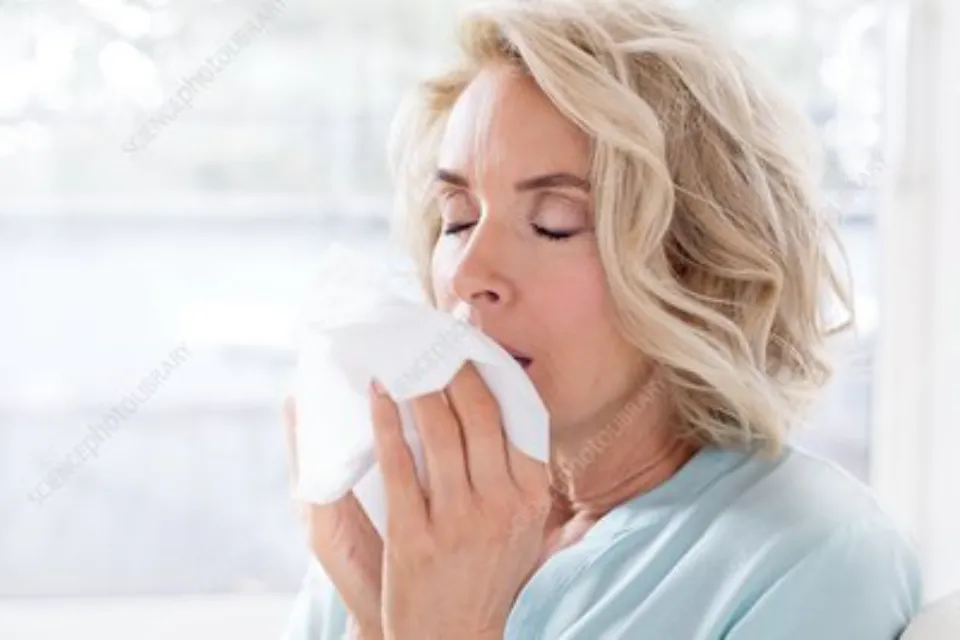
What Are the Symptoms of Geriatric Rhinitis?
The majority of the time, rhinitis symptoms, diagnosis, and treatment are the same for older adults as they are for other adult age groups. However, there are special considerations for senior patients, and symptoms of geriatric rhinitis may include:
- Constant feeling of nasal drainage
- Chronic or uncontrolled need to clear the throat of mucus
- Sense of nasal obstruction, most often while lying down
- Nasal crusting, especially during winter and in patients taking diuretics
- Vague facial pressure
- Decreased sense of smell and taste
How to Treat Geriatric Rhinitis?
Medical options are primarily used to treat geriatric rhinitis. Surgery, however, might be advised in some circumstances. In addition to the type of rhinitis, treatment for elderly patients is based on the patient’s health, medical history, slower metabolism, and increased risk of side effects. Options may include:
Medications—Most elderly patients (80%–85%) have chronic illnesses that they manage with a combination of prescription and over-the-counter drugs. Treatment options for geriatric rhinitis should be discussed with a primary care physician, an ENT (ear, nose, and throat) specialist, or an otolaryngologist because some medications, such as intranasal corticosteroids, antihistamines, anticholinergic sprays, and immunotherapy, can put patients at risk for harmful drug interactions.
Surgery—If turbinates surgery is an option, this can be decided by an ENT specialist. Patients should be referred to an ENT specialist for evaluation if they have structural abnormalities like a deviated septum or nasal valve collapse causing severe nasal problems.
Summary
There are different types of rhinitis that affect the elderly, and each category requires a different course of treatment. Since elderly people’s noses are so dry, the main goal is to moisten the nasal mucosa. When using first generation antihistamines and decongestants, extreme caution should be exercised.

